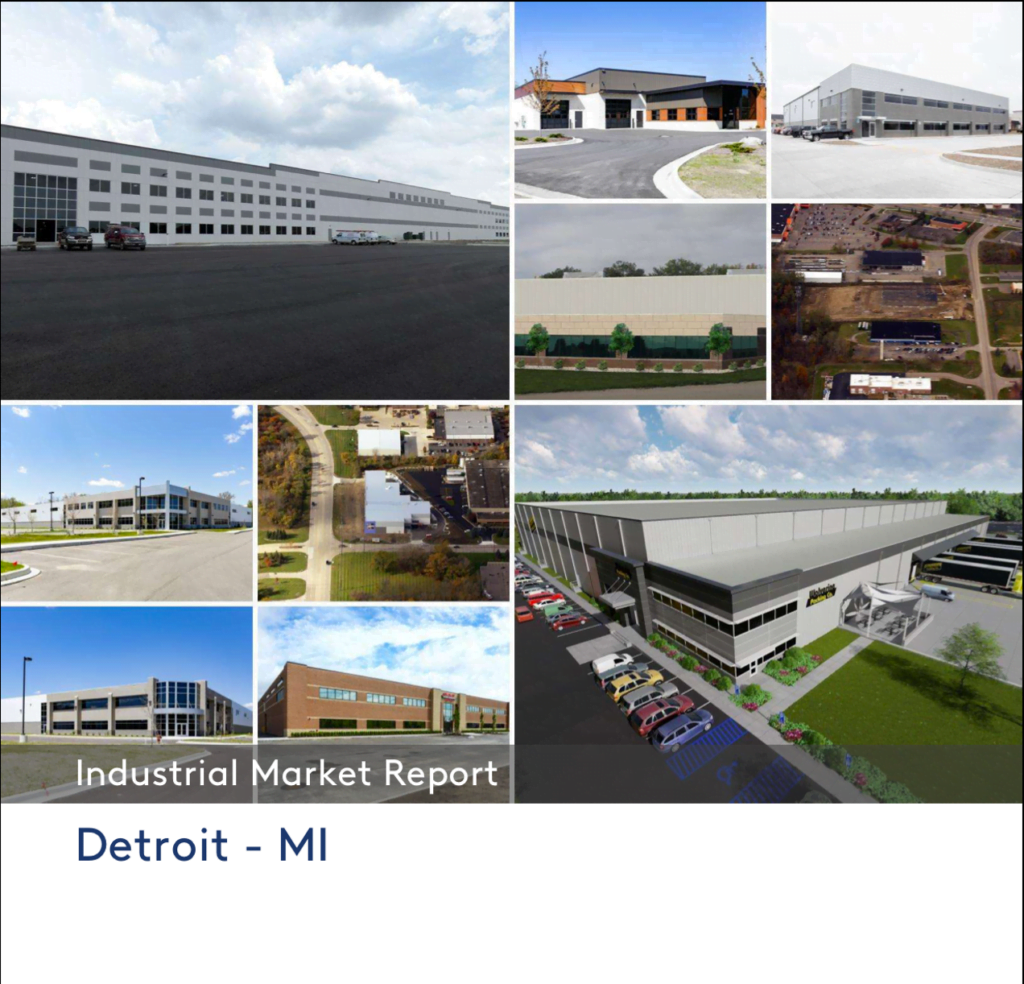This post originally appeared on tBL member Lynn Drake’s blog Compass-Commercial Blog | Expert Commercial Leasing Advice and is republished with permission. Find out how to syndicate your content with theBrokerList.

After being hit by one the fastest and deepest drop-offs in employment in its history, Detroit’s economy has rebounded at a faster rate than other comparable metropolitan regions. Sales prices for industrial real estate remain significantly less expensive in Detroit versus the national average. Ecommerce and Logistics drove recent demand, as more people relied on online shopping during the pandemic. While rent growth is expected to slow as global growth in manufacturing slows, it is expected to remain healthy in comparison to other regional markets. Here is the Industrial Market Report.
Q1 Industrial Market Report
Leasing
Industrial leasing in Detroit enjoyed modest growth last year, even it didn’t keep up with national record-setting numbers. Traditionally over-reliant on manufacturing, the good news for Detroit is the increase in diversification. Last year, the largest move-in of the year and the largest lease of Q4 belonged to Amazon, which represents the shift toward eCommerce and Logistics. Other heavy hitters in terms of investments include Dakkota Integrated Systems, General Motors, and Fiat Chrysler, who is building the first new auto assembly plant in Detroit in 30 years, investing $2.5 billion and adding 5,000 new jobs.
Renting
Rent growth in the market will turn negative in the coming quarters, with rents in Detroit falling 7.6% by mid-2021, which will be one of the sharpest contractions among metro areas in the region. However, rent growth is expected to recover in 2022, closing out the forecast period about 7% above their Q3 average. Overall, rent growth for flex spaces represents the largest downturn, while logistics and specialized rents are elevated with limited vacancies and expected to remain that way for the projected period.
Construction
Slightly less than 2 million SF were delivered last year, maintaining a slower than the national average but still steady growth rate. On the whole, inventory expanded by 2% since 2015. The West of Van Dyke/Macomb Submarket saw last year’s largest delivery, while a 296k SF distribution facility at Warren Commerce Center was completed in December.
Here are the top submarkets in Detroit for the first quarter:
- Airport District
- Auburn Hills, Pontiac, Rochester
- Royal Oak
- Central I-96
- Groesbeck North
Under Construction Properties
With about 6.7 million SF currently under construction, development activity has accelerated. Amazon is behind the largest development, a 1 million SF distribution facility in Pontiac, which should be completed by the end of this year. This facility is just one part of a larger plan to create 2,000 new jobs across five new facilities in the Detroit area. Ashley Capitol is also in the process of developing several distribution and logistics sites in the Royal Oak and Airport District Submarkets.
Here are the 5 largest properties that are, or were, under construction in the first quarter:
- 1200 Featherstone Rd
- 1430 E 10 Mile Rd
- 2100 S Opdyke Rd
- 42000 Ecorse Rd
- 37350 Ecorse Rd
Sales
After record high investments at the beginning of 2020, the pandemic knocked the wind out of growth for Q2. Nevertheless, the industrial sector picked up during the second half of the year, ultimately outperforming by 2019 annual sales by 23%. Prices slid up a bit as well, averaging $59/SF, one of the highest in the region. The largest recent sales were driven by portfolios, such as Bedrock’s acquisition of part of Sakthi Automotive Group’s portfolio, which largely included sites adjacent to a U.S. Port of Entry where the Gordie Howe International Bridge is being built to increase trade between the US and Canada.
Economy
During the worst of the pandemic last April, total employment in the Detroit metro area was down by 30% compared to employment levels in March. However, close to 60% of those losses were temporary and have since been added back into the labor market. While Detroit, like the rest of the country, will continue to grapple with the aftermath of the pandemic, the city is well positioned to support steady job growth over the coming decade.
Revived interest in manufacturing coupled with impressive industry diversification promises to aid in the economic recovery of the region. Moreover, the apartment market is an important indicator of the health of regional economies, and the recent performance of Detroit’s apartment market is very positive. Thanks to the affordability and surplus of housing in Detroit, as well as the sharp rebound and surge in manufacturing, the city is well on its way to pre-pandemic economic levels.
This is a summarized version of an industrial market report that was originally created by CoStar. The full report can be found here.



